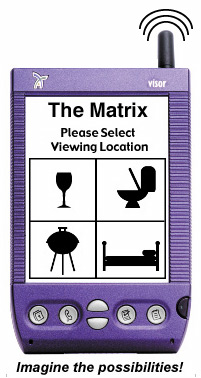Think of
this scenario. You are in your home, you slide in one Visor module and
instantly you have access to a server in the basement which handles
video-on-demand, Internet access, audio, cam control, lighting, climate
 control, and telephony. From your Visor you can view who is at the front
door, play music in any room, turn the downstairs lights off, adjust
the temperature, check your e-mail, answer the telephone, or pipe video
to a TV in the bathroom (you laugh now, but they mocked Galileo too).
The idea I am presenting is that it is a mistake to view the handheld
as a glorified address book or wireless e-mail checker. Handspring is
the first company who seems to understand that. The Visor currently
gives us a working peek into our future, which is the convergence
and simplicity of connectivity. However, the handheld of the future
isn't a stepped up remote on steroids, but a doorway to your
world.
control, and telephony. From your Visor you can view who is at the front
door, play music in any room, turn the downstairs lights off, adjust
the temperature, check your e-mail, answer the telephone, or pipe video
to a TV in the bathroom (you laugh now, but they mocked Galileo too).
The idea I am presenting is that it is a mistake to view the handheld
as a glorified address book or wireless e-mail checker. Handspring is
the first company who seems to understand that. The Visor currently
gives us a working peek into our future, which is the convergence
and simplicity of connectivity. However, the handheld of the future
isn't a stepped up remote on steroids, but a doorway to your
world.
Smaller
isn't better, smarter is.
Currently
there are companies developing technology for handheld video streaming
and the like. Many of these companies see the handheld, not the PC,
as the heart of your digital world. This is a myopic view. Personally,
I don't want to watch movies or video on my handheld. Why is it that
we are always looking to see how much we can pack into the smallest
space? I blame the Guiness Book of World Records for this. If we can
liberate ourselves from this concept we may also liberate the technology.
I am not interested in how many handhelds I can fit on the head of a
pin. What I want out of a handheld is the ability to direct my world,
not contain it within a 3" x 5" device. Do you really want to watch
The Matrix on a Visor or would you rather tell your Visor to send The
Matrix to the nearest 32" video screen? Real progress is the ability
to direct and control information, not just squint at it.
The Thrill is Gone >>